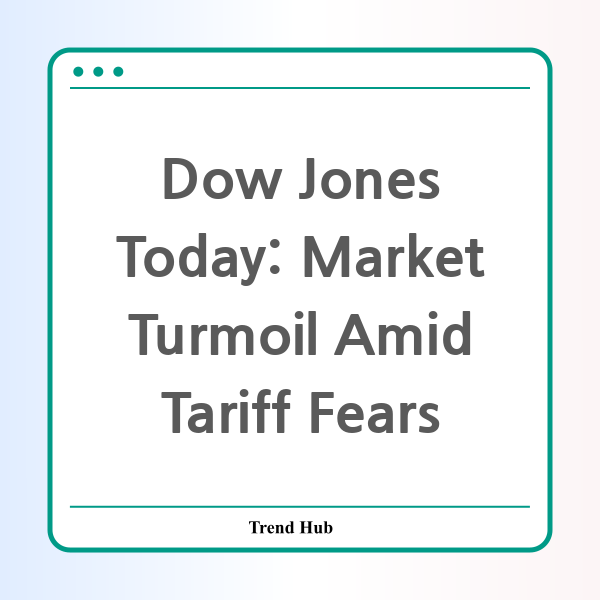* This website participates in the Amazon Affiliate Program and earns from qualifying purchases.

As global stock markets face significant turbulence, the Dow Jones Industrial Average is taking center stage in a narrative filled with uncertainty and concern over impending trade wars. With the announcement from China that it will impose retaliatory tariffs on U.S. goods, investors are naturally anxious, leading to a considerable decline in share prices and sparking discussions about the future of trade relations between the two economic giants.
On Friday, the S&P 500 fell 2.5 percent in early trading, marking its most severe loss since the tumultuous days of 2020. This downturn is not an isolated incident; it reflects a broader trend of declining global market performance fueled by fears of an escalating trade conflict. Tech companies, often at the forefront of such economic battles, have not been exempt from this fallout. Notably, major players like Apple have seen their shares drop drastically, while other firms, including Nike and Caterpillar, also experienced losses around 5 percent.
The scale of this downturn is significant. With the Chinese government announcing additional tariffs on American imports and targeting U.S. businesses it deems "unreliable," fear is mounting among investors about the implications for economic growth and international trade stability. Analysts and economists are now voicing concerns that what was once considered a trade disagreement could quickly spiral into a full-blown trade war, with far-reaching consequences not just for the U.S. and China, but for global markets as a whole.
In response to these concerns, President Trump reaffirmed that his administration's policies regarding tariffs will remain unchanged. He characterized China’s response as part of a larger, ongoing economic strategy and indicated that the U.S. would continue to pursue its course of action without yielding. This firm stance has elicited mixed reactions from market participants. Some believe that steadfastness may lead to long-term economic benefits, while others warn that unwavering policies could exacerbate tensions and hurt market confidence.
Amid this climate of uncertainty, traders on the New York Stock Exchange have been vocal about the atmosphere on the trading floor. Iconic trader Peter Tuchman highlighted the mood during these tumultuous times, describing it as one of unease and caution. His insights emphasize the broader sentiment among Wall Street participants who are grappling with the implications of these developments and their potential impact on investments.
As the stock market continues to react to this unfolding situation, investors are advised to stay informed about international trade policies and economic indicators. Monitoring the Dow Jones and other indices will be crucial in assessing the overall health of the market during this period of volatility. Understanding the factors influencing stock prices, such as tariffs and international relations, will empower investors to make more informed decisions in this complex landscape.
In conclusion, the current state of the Dow Jones reflects broader economic anxieties tied to trade relations, particularly between the U.S. and China. As these global dynamics evolve, staying engaged with market trends and developments will be essential for anyone involved in investing or financial planning.
* This website participates in the Amazon Affiliate Program and earns from qualifying purchases.